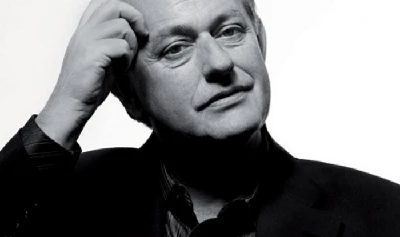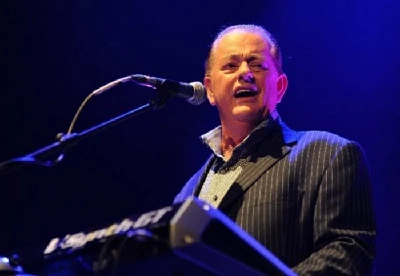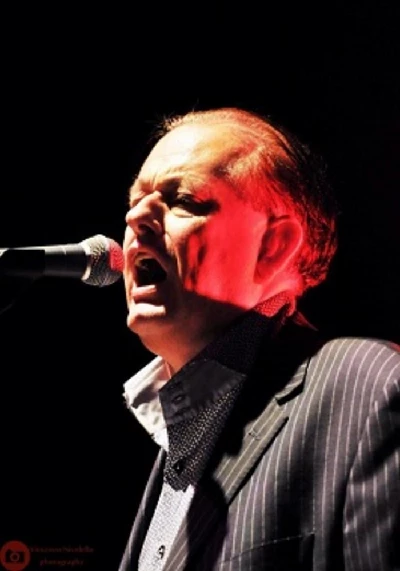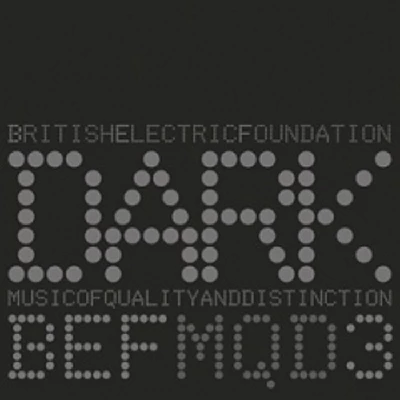published: 29 /
4 /
2013
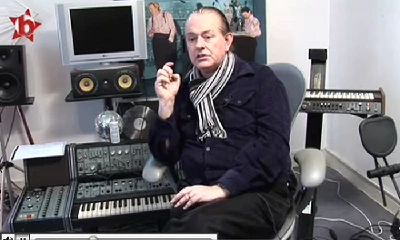
The project of Heaven 17 synthesiser player Martyn Ware, British Electric Foundation is about to release its latest covers album, ‘Music of Quality and Distinction Volume 3 –Dark’. John Clarkson speaks to Ware about the album which includes appearances from Boy George and Sandie Shaw
Article
British Electric Foundation (B.E.F.) is the band and production company of Heaven 17 synthesiser player, Martyn Ware.
Ware and British Electric Foundation’s co-founder Ian Craig Marsh, who also played keyboards, were both in the original line-up of the Sheffield group the Human League, and appeared on and co-wrote their first two albums, ‘Reproduction’(1979) and ‘Travelogue’(1980). After clashing over artistic differences with the group’s singer Phil Oakey who wanted to take the band in a more populist direction, Ware and Craig Marsh both left the Human League and formed B.E.F.
British Electric Foundation was initially conceived as an instrumental project, and the duo released their debut album, ‘Music for Stowaways’ in 1981, a year after they formed, which, coming out initially only on cassette, was inspired by the production of the first Sony Walkman.
By the time of their second album, British Electric Foundation had settled on their current format, which involves using a rotating cast of singers who cover new electronic versions of classic songs. ‘Music of Quality and Distinction Volume One’, which came out in 1982, included in its track listing covers by the Associates’ Billy Mackenzie of David Bowie’s ‘The Secret Life of Arabia’; Glenn Gregory of Glen Campbell’s ‘Wichita Lineman’ and Lou Reed’s ‘Perfect Day’; 60’s icon Sandie Shaw of Dionne Warwick’s ‘Anyone Who Had a Heart’ and Tina Turner of the Temptations’ ‘Ball of Confusion’.
Ware and Craig Marsh’s friendship with Gregory, who they had known since they were in their early teens, was such that by the time of the release of the first volume of ‘Music of Quality and Distinction’ they had also formed another electronic group Heaven 17 with him. After their 1981 first single (‘We Don’t Need) This Fascist Groove Thang’, an attack on the prevalent skinhead culture of the time, was banned by the BBC, Heaven 17 went on to have subsequent Top 5 UK hits with ‘Temptation’ and ‘Come Live With Me’ in 1982 and 1983. They have now recorded eight studio LPs, including the bestselling ‘Penthouse and Pavement’ (1981), ‘The Luxury Gap’ (1983) and ‘How Men Are’ (1984) albums.
With Heaven 17 taking precedence, ‘Music of Quality and Distinction Volume Two’ did not follow until 1991. Amongst its covers this time were Billy Mackenzie with Deniece Williams’ ‘Free’; Terence Trent D’Arby (whose 1987 debut album, ‘Introducing the Hardline According to Terence Trent D’Arby’, B.E.F. had co-produced ) with Bob Dylan’s ‘It’s Alright Ma, I’m Only Bleeding’ and Turner again with Sam Cooke’s ‘A Change is Gonna Come’.
With Ian Craig Marsh having dropped out of both Heaven 17 and British Electric Foundation in 2006, B.E.F. made their live debut in 2007 at the Shepherd’s Bush Empire in London, playing five songs with Gregory, Heaven 17’s female singer Billie Godfrey and Propaganda’s Claudia Brucken as vocalists at a tenth anniversary memorial concert to Billy Mackenzie who had committed suicide in 1997.
A second concert followed at The Roundhouse in London in 2011, with vocalists this time including Gregory once more, Erasure’s Andy Bell, Midge Ure, Scritti Politti’s Green Gartside, ABC’s Martin Fry, Boy George, Kim Wilde and Sandie Shaw.
This year is an especially prolific year for B.E.F. There will be two more concerts, the first on October 3rd at the Shepherd’s Bush Empire, and the second the following night on October 4th at the O2 Academy in Sheffield. The vocalists will include Bell, Shaw, Gregory and Wilde, and they will be backed, as at the first two gigs, by Heaven 17’s live group.
B.E.F will also be releasing their first album in twenty-two years on May 26th, the third volume in the ‘Music of Quality and Distinction’ series which Ware has entitled ‘Dark’. Its tracks encompass together ex- Long Blondes’ front woman and Ware’s fellow Sheffielder Kate Jackson with Blondie’s ‘Picture This’; Boy George with the Stooges’ I Wanna Be Your Dog’ and Lou Reed’s ‘Make Up’; Gregory with Frank Sinatra’s ‘It Was a Very Good Year’ and the Associates’ ‘Party Fears Two’, Sandie Shaw with Gladys Knight‘s ‘Just Walk in My Shoes’ and Billie Godfrey with Bronski Beat’s ‘Smalltown Boy’.
Pennyblackmusic spoke to Martyn Ware about ‘Music of Quality and Distinction Volume 3 –Dark’ and the forthcoming shows.
PB: You started touring fairly late on with both British Electric foundation and Heaven 17. With Heaven 17 you didn’t start touring with them until 1997, and with British Electric Foundation it wasn’t until 2007 and the ‘Tribute to Billy Mackenzie ‘concert. How much of that has been down to waiting for the technology to catch up with you and how much of that has been down to cost?
MW: It was a combination of both those factors really. It would also have been a real problem to do it with the first two B.E.F. albums simply because we didn’t have a band.
Now we are very experienced touring with Heaven 17, and we are very happy with the band that we have got there. We have expanded it slowly to the point where we have a band that we think can cover most kinds of music now and not sound like somebody in a pub doing karaoke.
That is the main reason why it makes a lot of sense for B.E.F. to play live, but there is also an appeal to doing it live because we have never really done it live before. For me, it is not about nostalgia. It is about wanting to put to bed what these things would have sounded like live if we had had the chance to do them in the past. We are doing these forthcoming shows partly to promote the new album, but it is mainly a labour of love.
PB: Has it been difficult to organise the forthcoming two shows? Getting together people like Andy Bell, Sandie Shaw, Kim Wilde and Glenn Gregory all on the same bill and the same evening can’t have been easy.
MW: Myself and my manager have done it all ourselves. A lot of people involved are good friends and we have been doing it on a series of favours. They are getting paid a little bit for the concerts, but there is not really any money involved and people are doing it because they like the idea of doing it. I have really been appealing to people’s better nature and using whatever little charisma I have got to try to persuade people to do it for nothing (Laughs).
PB: The last B.E.F. concert at The Roundhouse in London had vocalists doing two songs each, one from the two earlier albums, and one from the forthcoming album ‘Dark’. Are you adopting a similar format for these concerts?
MW: It won’t be exactly the same. Some people will do three numbers and some will be doing one. It should be about a two hour show.
PB: Heaven 17 have been the more prolific act for the last thirty years, and many people will see them as your main band. British Electric Foundation obviously, however, came first and Heaven 17 was born out of British Electric Foundation. Do you see B.E.F. as a secondary project or do you see it as having equal weighting with Heaven 17?
MW: It is an occasional project for me. B.E.F., however, in theory was the producer for all the big records that I ever did. I always went under the name of the British Electric Foundation. The Tina Turner and Terence Trent D’Arby records, for example, that I produced were all B.E.F. records and went out under that aegis. I have always liked the idea of this mysterious thing in the background. What is B.E.F.? It is like a brand. It has got a bit of mystery to it which plain old Martyn Ware doesn’t.
So essentially all my productions go out under the aegis of B.E.F. This is the first time, apart from The Roundhouse gig, that we have, however, managed to put it together in physical form really.
PB: One of the joys of British Electric Foundation must be that it can be anything you want really.
MW: It is adaptable. The artists involved like the idea of this kind of fluid collective and very collaborative approach. There is something kind of funky about it. I have always found inspiring bands like Parliament and Funkadelic where they would have a fluid number of people on stage, and it would last for as long as they fancied it to last.
‘Dark’ was done basically in my basement in my home. We did a few vocals in a professional studio, but that was it. Everything else was done on my computer in my house. At one level you have got this idea of an almost cottage industry creating things almost for the love of music, and then at another level coming out with stuff which sounds quite epic. It creates a nice artistic tension.
PB: How do you actually decide which covers you are going to do? Do you find the vocalists first and look for an appropriate song for them, or do you look for a song and find an appropriate vocalist?
MW: The way this one started was I got together a short list or a long list of about twenty-five songs. They were all based around the idea of what would happen if you removed the backing track from certain lyrics and then replaced them with a darker electronic version.
The song that originally inspired the idea was a song called ‘The Night’ by Frankie Valli and the Four Seasons. It is a great song, but if you actually listen to the lyrics for it, and imagine taking the backing track away from it, and replacing it with something that sounds like a film soundtrack then it could turn into a stalker song, and that was the kind of basis for the whole album really.
The other song which is the perfect example is ‘Didn’t I Blow Your Mind This Time? ‘While I ended up not using ‘The Night’ in the end, that song is on the album and is sung by Green Gartside. The original version of that song which is by the Delfonics has this beautiful kind of Philadelphia soul backing track and is kind of wistful, but if you give it a slightly different twist it is quite threatening from a lyrical point of view (Laughs).
PB: Every song on the album-‘Picture This’, ‘I Wanna Be Your Dog’, ‘Smalltown Boy’- has really strong lyrics, doesn’t it?
MW: Lyric-driven songs are becoming a rarity nowadays. Lyrics seem to be kind of static in contemporary pop songs. They don’t seem to be an important factor anymore. They are more like another texture to a dance track.
I have always loved narrative, story-based songs, and I think that comes from growing up with my sisters who owned a big record collection and who were a lot older than me. A lot of these songs have great melodies as well. I wouldn’t say that ‘I Wanna Be Your Dog’ has a great melody, but even that lends itself to making it into a story and a little pottered film in your head.
PB: Is one of your prime aims with the British Electric Foundation to try and bring something out of your vocalists that hasn’t been done before?
MW: They like the idea fundamentally of being challenged, and for them it is fun. I try not to direct them too much, so it gives them as much creative freedom as possible.
For instance, Andy Bell is on a track on this album, Kate Bush’s ‘Breathing’. He was in America at the time, so I just sent him the backing track and said, “Do what you want!”, and he did huge numbers of backing vocals and all sorts of interesting stuff. I worked with him before in 2004 on a project, ‘On Public Display’, at the Royal Ballet where I got him to do the voice of this clown character, and I realised then that he had this fantastic opera voice. In fact he did that opera TV show recently, didn’t he? (‘Popstar to Operastar’-Ed). So this is quite an operatic recreation of the original Kate Bush track.
We just give things a different twist with British Electric Foundation. That looks back all the way to the success we had with Tina Turner in the 1980s. We were the context that actually awoke people’s interest in her voice.
PB: How did you first become involved with her?
MW: I only had one track left to finish on the first ‘Music of Quality and Distinction’. album, which was ‘Ball of Confusion’. I had managed to persuade James Brown to do it, and we had arranged to fly over to Atlanta to his studio, and two days before we were due to fly his lawyer rang up and said, “James wants his percentage on all of the album and not just his track.” I said, “We can’t do that.” And he said, “Well, he’s not going to do it then,” and I said, “Okay, fine,” and I put the phone down.
I was absolutely gutted because I loved James Brown, so went into Virgin, our then record company, to look for some sympathy, and one of the people who ran Virgin said, “I am going to L.A. tomorrow. I am going to see a friend of mine, Tina Turner. What do you think about her on the album?” And I said, “Oh, my God! The woman who did ‘River Deep Mountain High’. Yes, it would be perfect.”
And so she came over to London. She had just been taken over at the time in her management by Roger Davies, who restructured her career, and she came into the studio and said, “Where’s the band?” and so we pointed at the Fairlight we were going to use for the track and she went, “Wow!”, and then she did the vocal first time. At the end she said, “That was quite a complex vocal, wasn’t it? There sounds like more than one man singing on that on the original,” and I said, “Well, it was the Temptations,” and she said, “Who are they?” It was unbelievable, but God’s honest truth it is true. It just shows how far she had moved on from her soul roots. We went on with her after to do ‘Let’s Stay Together’ and ‘1984’ for her ‘Private Dancer’ album, and worked with her for several years after that.
PB: If there has been one abiding factor for all three albums, it is Billy Mackenzie. He was obviously one of the main vocalists on the first two albums, and on this one you are covering ‘Party Fears Two’. Is it a different version to the one that Heaven 17 did on their last album ‘Naked as Advertised’?
MW: No, it is the same. It is exactly the same. I just thought that it deserved a bigger outing than releasing it just on that. That didn’t sell really very many copies, so I thought that people would really like it. It is a tribute to Billy as well, who was obviously a very important part of these songs.
PB: You must have some interesting stories to tell about how you met some of the other singers you have also been involved with. How did you first become involved with Sandie Shaw, for example?
MW: She was on the first B.E.F album, and was suggested to us because she was looking to re-launch her career back when we did that first album in 1981. I thought that was quite a revolutionary thing to work with her in those days, but then she went on to work with the Smiths. I loved her work from the sixties. I am not so keen on ‘Puppet on a String’, but neither is she. She has just announced her retirement from live performance. The gig in Sheffield on the 18th May is going to be her last ever live gig, so that will be a piece of history.
PB: What about Andy Bell? You toured with Erasure many years ago on one of Heaven 17’s very first tours in the late 1990s. Was that when you first met him?
MW: We had not met before then. I am not quite sure how, but we have become very close friends since then. We have done various projects together. He is like an angel. He is an amazingly talented person, and I have an enormous amount of respect for him.
PB: What about Kate Jackson who is a relatively new singer? How did you meet her?
MW: With my other hat on, I have a 3D Soundscape company with Vince Clarke from Erasure called Illustrious. We do installations around the world. We did one at the British Pavilion in Venice in 2006 for an architectural competition, and the opening act because the theme for it was Sheffield was the Long Blondes. That was where I met Kate and we have become good friends. She has guested at a couple of Heaven 17 shows before.
PB: There has been talk in the past of maybe doing a stripped down version of B.E.F. by incorporating it into Heaven 17 shows. Is that still something that you are considering?
MW: We are. Essentially we would quite like to do some shows in America, and I think it is something that might appeal to people there and if we maybe do a section in the middle of the show that is pure B.E.F.
PB: You have got these two shows coming up and are bringing out ‘Dark’ on May 26th. What are your other plans beyond that?
MW: We are writing some new material for Heaven 17, and have got quite a lot of Heaven 17 shows and festivals this summer. The work for Heaven 17 seems to be getting more and more. We are treating it as a career although there is not a huge amount of money in it, but we just love doing it so much. It is an amazing honour it is to be able to still do it after thirty five years.
PB: Thank you.
Picture Gallery:-
